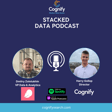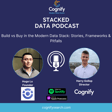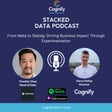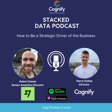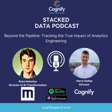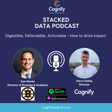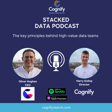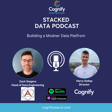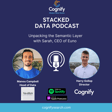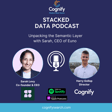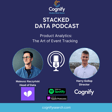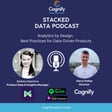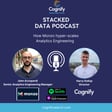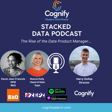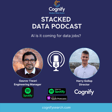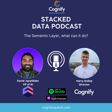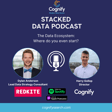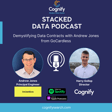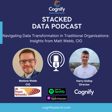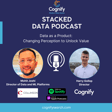Become a Creator today!Start creating today - Share your story with the world!
Start for free
00:00:00
00:00:01

019 - Zoopla: Monetising Data Products – Is Data Really the New Oil?
In our latest episode of The Stacked Data podcast, I’m joined by Veronica Saha, Head of Analytics at Zoopla (part of Houseful), as she shares real-world examples and strategies on data monetization.
In 2024, data teams need to evolve beyond being mere support functions; they must become strategic drivers. Many data teams have struggled to show/prove their true value. The monetisation of data comes in many different forms, however, it's clear that raw data is not valuable on its own.
Data only hold value as insight driving decisions. It needs to be packed into a PRODUCT!
We discuss the need to treat data as a product in order to effectively implement a monetisation strategy.
🎙️ Episode Highlights:
- Defining Data Monetization: What exactly do we mean by 'data monetisation'? When is the right time to think about it? How can data create business value?
- Identifying Opportunities: How do you identify areas for data monetization? What's the role of technical architecture in this process?
- Building a Revenue-Focused Team: Challenges and considerations in building a team focused on generating revenue through data products.
- Feedback Loops and Continuous Improvement: Establishing effective feedback loops and optimizing data products for better monetization outcomes.
- Securing Leadership Buy-In: Challenges in securing sign-off and budget from leadership.
- Common Challenges and Lessons Learned: Insightful lessons from Zoopla's journey in overcoming challenges in data monetization.
Transcript
Introduction to Stacked Podcast
00:00:02
Speaker
Hello and welcome to the Stacked podcast brought to you by Cognify, the recruitment partner for modern data teams hosted by me, Harry Golop. Stacked with incredible content from the most influential and successful data teams, interviewing industry experts who share their invaluable journeys, groundbreaking projects, and most importantly, their key learnings.
Data Teams as Strategic Drivers in 2024
00:00:26
Speaker
So get ready to join us as we uncover the dynamic world of modern data.
00:00:34
Speaker
In 2024, data teams need to evolve beyond being a mere support function. They must become strategic drivers. We've delved into this in several previous episodes. Today, we're taking it a step further. I'm thrilled to have Veronica Sahar, the Head of Analytics from Zoopla, joining
Transforming Data Teams into Revenue Generators
00:00:52
Speaker
me. We're going to be delving in to strategies and approaches on how you can transform your data team into a direct revenue generator through data monetization.
00:01:02
Speaker
Welcome to the show, Veronica. It's great to have you on. How are you doing today? Hi, Harry. Thank you so much for having me. I'm really excited to be here and have a great conversation with you. Yeah, me too. We've had a lot of interesting calls on the build-up to this, so really excited to dive in, and I'm sure the audience are excited to hear what you have to share. But first off, it would be great if you could just give us a nice overview of your career to now and a bit more about, I suppose, what you do at Zoopla and leading the team there.
00:01:31
Speaker
Sure. I've been working in data and analytics for the last 15 years, covering business insights, customer segmentation, retention, marketing analytics. And then over time, I've covered analytics infrastructure, analytics for personalization, and building high performing teams. Currently at Zoopla, I lead the analytics team, which has implementation engineers covering data collection.
00:01:59
Speaker
through events and also managing analytics tooling. I work with analytics engineers covering the data modeling, and then a group of analysts who are working really closely with the business. Amazing. It'd be great to touch on how you got into data. What was your journey and your path to where you've got to?
Veronica's Journey in Data and Analytics
00:02:20
Speaker
Well, my introduction to data was through digital media masters quite a long time ago, and it was the beginning of Google Analytics. It was the beginning of Facebook, so quite some time ago. But my introduction was through the importance of analytics to answer questions and delve into problem solving and having the opportunity to solve them actually through data.
00:02:44
Speaker
It was quite early days at the time and everything has evolved since then. But I see today data being used and useful, not just for problem solving efficiencies, but also a revenue generator in its own right. Now, it's not easy to get there and get revenue and financial returns, let's say, out of data.
00:03:05
Speaker
But I don't think we are far off. And more and more businesses are focusing on this topic because unlike other assets, data is quite special. So data can be used in many places and it doesn't lose its value. It doesn't run out after you use it. You can use it again. And sometimes you actually generate a lot more data in the process of using it as well.
00:03:28
Speaker
So actually, it's quite a different type of asset that I think businesses should start taking more advantage of going forward.
What is Data Monetization?
00:03:37
Speaker
Amazing. Well, that's, I suppose, really what the whole topic of this episode is going to be. We're going to pull open up your brain and peer inside as to your knowledge on data monetization. Data has often been coined as the new oil, hasn't it, ever since it really become a big part of
00:03:54
Speaker
of corporations' lives, but like oil, I think, you know, data needs to go through, and oil needs to go through a long refinement process before it actually holds any value. So we've obviously been mentioning the word data monetization, Veronica, but to kick things off, let's start with the basics. You know, what do we mean when we say data monetization?
00:04:15
Speaker
I'll go back to what Bart Wixson mentioned in her book, Data is Everyone Business. She defines data monetization as the generation of financial returns from data assets.
00:04:26
Speaker
Now, impact can be financial or it can be reducing expenses, reducing risk, creating efficiencies, creating customer support enhancements. So I would say generational value and tangible value from data would be a wider definition, but depends quite a bit on the type of business and the goals that every business tries to achieve.
00:04:54
Speaker
Amazing. So I think people are probably aware of the term data monetization. But as a strategy, it's hard to know when to start thinking about it. Initially, I think organizations are thinking about just getting out some basic reports and understanding of what's going on internally. So when you're talking about a data monetization strategy, what is a data monetization strategy? And when would be the right time to start thinking about it?
00:05:23
Speaker
Sure. I would put it simply that monetization strategy should focus on converting data assets into tangible value, like I mentioned earlier, right? And that can be, financial can be a competitive edge or strategic advantage, right? But I think we should start by looking at understanding the value proposition of data for each business, identifying the potential, the beneficiaries, is it a customer, is it business?
00:05:51
Speaker
how do we package and present the data effectively, thinking about compliance with data privacy regulation, which are really key. In this day and age, we need to start thinking about security and protection of data. So even before thinking about what the data is and what problem needs to solve, there are quite a lot of considerations around it. So if you think about how airlines
00:06:14
Speaker
use passenger data. So strategy in their case is to use people's data to personalize their services, create bundles based on travel patterns, enhance customer experience, and then generate additional revenue streams. So that's an example of how you think broadly about a data strategy.
00:06:35
Speaker
But widely, I think businesses need to start thinking about data really, really early on when you start collecting it. So I mentioned that I have two people in my team looking after data collection. So if you think about data lifecycle, it starts with quality, it starts with collecting the right information and also making sure it's accurate, making sure it's packaged in a way that can add value down the line. Because if these initial foundations are not in place, then you can't really
00:07:05
Speaker
we use data to its full value down the line. So when we should start thinking about it as soon as possible, so then you can start collecting it in the right way. And I would say every business needs to think about utilizing data that they are collecting
00:07:22
Speaker
these days anyway. So like I said, either monetizing directly, but indirectly, you can generate so much value through optimization of business processes, enhancing customer support, enhancing your products through data, so on and so forth.
00:07:38
Speaker
Amazing. Amazing. So what was clear there was I suppose the two points is that monetization of data doesn't have to be that direct monetization where you've actually got cash flowing into the business through a data product that somebody's purchasing, but
00:07:53
Speaker
indirect monetization, increasing efficiencies, improving operations, sales processes. So it's good to have that broad outlook onto how you can leverage and monetize that data. But the other point that you made, which was also, I think, really important was thinking about how you collect data and then how you store that data from the get-go. It's
00:08:17
Speaker
great just to have it being dumped somewhere. But that's, again, it's like oil being unrefined. It holds no value. So thinking about what you want to leverage that data for as part of your initial strategy sounds to be a really key aspect of it.
00:08:32
Speaker
Yeah, I would just add to that, right? Optimization and good use of data actually happens already. If you think about the marketing department, they are the ones sending newsletters to their customers. However, if you take it further, you can create personalized messaging.
00:08:48
Speaker
through the communication. So even if we are not talking about monetizing data at a wide business level, even department level can leverage data in a really useful way. So in the case of marketing example, they can increase the retention.
00:09:04
Speaker
and engagement metrics, which means you save money from not having to acquire all those customers because you get them to return more and more. So even if at the local level, department level, you actually can leverage data and monetize data and reduce costs quite significantly.
00:09:25
Speaker
Amazing, amazing. So look, I think the first stage then is assessing and identifying areas where data monetization is possible and it's going to be most effective as well. So how'd you go about identifying these areas? What are their different approaches to monetization? I think that that prioritization piece is something I know a lot of teams that often struggle with when they're so overloaded with tickets, requests, and use cases.
00:09:51
Speaker
I agree. This is like a trick question in one, so I'll try to break down a little bit. When teams are overwhelmed by requests, probably the problem to solve there is capacity. But in order to actually think about data monetization, you need to take a step back and step back from the firefighting and the requests.
Monetization Strategies: Direct vs Indirect
00:10:12
Speaker
think a bit wider, right? The way to monetize data can be direct and indirect if we categorize them really, really widely, right? So if you think about direct monetization, earlier on, like, I don't know, 10, 15 years ago, data selling, right? Like data sets being sold to different parties was a way to monetize data. But I think over time, businesses realized that there is a lot more value in
00:10:40
Speaker
packaging it in a better way, selling the product rather than the raw data. So selling data sets still happens, but probably is not the biggest revenue stream. However, data as a service is becoming
00:10:56
Speaker
more and more of a revenue stream. So an example of that is providing insights as a service. So you have the raw data, you package it as insights and you help other businesses solve the problem or your customers giving them the right information at the right time. In the case of property, it's quite useful for people to understand the value of their home, understand
00:11:18
Speaker
how big of a mortgage they can get, things like that. For instance, a lot of inserts are generated and they are part of the product, enhancing the current product. Another example of data as a service is APIs, so giving API access and then monetizing that, embedding data into a website or a product, and so on.
00:11:38
Speaker
Another way to monetize data directly is data as a product. An example of that is packaging it in a way that makes easy for people to buy. An example of that would be the house estimate from HomeTrack, one of the sister companies of Zoopla. For them, the customers of that product would be mortgage lenders in the UK.
00:12:03
Speaker
Another product like a consumer product that Zoopla has launched gets a report with a lot of information about your property, history of it, value, and so on. Again, something that people can buy directly. I mentioned earlier enhancing existing products with data. Again, that depends very much on the product, but
00:12:25
Speaker
lot of people are interested in, let's say, customer demand or what the market is doing in a specific area when it comes to property, the location matters quite a lot. So these are some examples of direct monetization where you package data in a way and sell it to customers. Indirect monetization involves
00:12:49
Speaker
affecting one or more of your business processes, operational efficiencies, code savings, productivity, as I mentioned before, and also identifying new prospective customers or markets, improving customer loyalty, optimizing supply chains. There is a lot of value in indirect monetization of data. Now, what's difficult with this indirect monetization that it's really hard to put a number on it. What people need to do is probably just
00:13:17
Speaker
measure it early on, so actually they can prove that data is adding a lot of value. Something that's quite interesting, another example of indirect monetization is something called bartering or trading with data. So when we have loyalty cards from various brands, that's the exchange. They collect a lot of data about our behavior and then we get something in exchange.
00:13:42
Speaker
The last one I would mention is something called inverted data monetization, which is in the case of, let's say, a health care provider, they can't really share the information of the patients. However, they can bring others products and expose them to their customers. So actually, they can get the referral fee or advertising fee, and you can monetize your customer data in a different way. So this goes back to,
00:14:11
Speaker
What is the business trying to achieve? How is monetization fitting their context, their customers, and the kind of data they have? Amazing. I mean, there's obviously so many different ways that you can look to generate data. I think the key points around the direct monetization is that data in its raw format is a lot less valuable than what it was. It's very easy to collect data now, but where the magic happens is when you provide something that is usable and
00:14:40
Speaker
and actionable and this whole movement towards treating data as a product, I think both for indirect and direct monetization, I think is a good shift in mindset for data teams and helps to show what value you're bringing. Obviously, it's much easier on the direct monetization, but I liked your point around tracking that from the beginning on the indirect because that's so important for teams now.
00:15:08
Speaker
So, like in any data project, the technical architecture needs to be fit for purpose for a data product to be successful. Can you share what this looks like and any considerations to take into account when building your stack and your architecture for success?
Building Infrastructure for Data Success
00:15:29
Speaker
Yes, this is actually a key part when you develop data products or data as a service. In this day and age, when you start selling data as a product, data needs to be always on, needs to have a team that makes sure that the information flows. It's there at the right time with the right level of quality. In terms of infrastructure, I'm a bit biased, but
00:15:58
Speaker
I would say probably we need to talk about the modern data stack that sits in the cloud because if we have data siloed in various systems, it's really hard to put them together and build a product on top of that. So having data in one place, ideally in a cloud platform, having this capability to connect to wider services, I think is quite key.
00:16:24
Speaker
When building data infrastructure, you need to think about is it easy to try experiment and then deploy? Will it help us move quickly? Is it cloud native? I keep talking about that because you need to take advantage of live connectivity from other live data platforms. If you need to scale it, that's the place to be for scaling. Otherwise, you need to start building a lot of infrastructure in-house and that costs a lot of money and takes a lot of capacity from teams.
00:16:51
Speaker
Can it handle modern data volumes, which are, like you said, it is to collect a lot of data, then you need to be able to store it and manage it because we can't really function in data siloed world if we want to create data products.
00:17:05
Speaker
How does it integrate to the wider tech stack of a company? And also, it's quite important when thinking about infrastructure to think about the next two years, two, three years. What do we want to build? Will this infrastructure we are putting in place going to be able to scale and adapt as our data strategy evolves? Because again, you do not want to build something that needs to be replaced, replapped for maybe two years because that slows everything down.
00:17:35
Speaker
And again, depending on what is required, do we want kind of a user experience built in? This is quite an interesting question. I have to touch base on the team, because when you talk about the infrastructure that you need to build, you can't decouple it from the team that's going to build it and look after it, right?
00:17:53
Speaker
So if you have a low maturity, small data function, probably you want to pick tools that have a great user interface and they are easy to use. An example of that would be Segment, the customer data platform. So Segment
00:18:09
Speaker
It has incredible capability. You can build single consumer views in there. You can connect it to a lot of third parties. It's an incredible tool, but it has also great user interface. So if you do not have a lot of data engineers in-house,
00:18:27
Speaker
people with a bit of training can use it. However, if you have capability and you want to invest in this space and you start building a data team with data engineering function, then you can go a lot more technical. You can start building complex data pipelines that need maintenance and being looked after over time.
00:18:50
Speaker
What I'm trying to say here in terms of infrastructure, you can't decouple it from people. You can decouple it from the structure of your data team. This goes back to monetization. It's good to step back, I think, a few years in the future. What do we want our stack as well as team look like? Because the two actually are interdependent.
00:19:13
Speaker
That's amazing. So now we've identified some use cases for both indirect and direct monetization. We've got our architecture in the right place for where we want to go. We've also started thinking about how we're going to structure our team for success. What would be the next steps in making data monetization a success and a reality?
00:19:34
Speaker
Of course, now that we talked about teams and infrastructure data, we need to talk a little bit about the wider business and the context where all of this sits. And we need to also consider how it aligns with the overall business goals.
00:19:51
Speaker
what the digital strategy is, what the data strategy overall is. Who are we trying to reach with data products? External customers, internal customers or employees, partners, agents, distributors. So just having clarity on who your customer is because that informs what you build and how. What sort of hidden insights you might have in the data warehouse for your audience.
00:20:15
Speaker
just do a bit of an audit. What's in there? What's the value? Where can we use it and how? And then starting with, I would say, start small, right? Start talking to your internal customers about the value of the data, what's in there, what it's good for. Start trialing POC exercises again with people internally to just raise the awareness of
00:20:41
Speaker
data being used as an asset, not just for performance measurement and with the people who actually need it. So I gave the example of the marketing team. Again, another example would be the commercial team. Again, people who love using data because it gives them a lot of insights. So just start working with various departments in the business and surface all these insights. Now, when it comes to the
00:21:08
Speaker
bigger pieces when it comes to data products. This has to go back to the business strategy because it would require the significant investment and in people time resources. So that's not something that you can actually do locally with various teams. You actually need to work with the leaders of the business and persuade them
00:21:32
Speaker
that this is a growth opportunity. This is a lot of value to be had down the line. So it's a matter of scale. So locally you can add a lot of value, the indirect monetization part that we talked about. But when you try to go into the direct monetization part, which is indeed where a lot of, let's say,
00:21:55
Speaker
financial return would be, it would require like, like anything, a bit of investment upfront. So then getting buying from, from, from leadership and aligning data products to the data strategy, uh, it would be key, but I would say focusing on growth, focusing on the opportunities to increase retention, to bring new customers to, uh, increase engagement. These are all.
00:22:21
Speaker
opportunities that people can start looking at even before talking about data products. So what I would say is people shouldn't just not do anything until they have everything in place, until the infrastructure is in place, until the team is in place. I think we should try and in whatever influence areas we have from all data test, bring proof of concept and show people how they can use it.
00:22:46
Speaker
I loved your emphasis on the importance of defining the customer of the data team. I think every organization should have a single definition of what a customer is within their own departments. But yeah, specifically for data teams, I think that, and this goes for anyone within the data team from data engineering all the way through to your insight analysts and data scientists.
00:23:10
Speaker
The customer is the one that's going to be consuming your product, whether that's internal or external, and they're the one that's going to be using it. So they have to be part of that feedback loop, I think, from the start. It's how you decide what architecture, what design decisions you're going to make will influence
00:23:27
Speaker
of what you're going to create. And I have spoken to many analysts and scientists who have maybe gone away and spent four weeks building something, only to find out that it's not what the stakeholder wants, because they haven't really spent that time to understand what their customer's looking for. And so I thought that was a really excellent point. And I suppose that your last point around, I suppose, have you got anything else to add on that, I suppose, Veronica, before I move on?
00:23:54
Speaker
Yeah, just one comment to add there, this way of developing product, this methodology has been around for a very long time, but now it's applicable to data as well. And if people just think about that to your point, we'll reduce time and effort.
00:24:09
Speaker
Product management stuffing new, I mean, you know, organizations have been inventing products since year dot. So that, and they've got very good at refining their strategies. It seems crazy that we don't try to incorporate that into the life cycle of data now, to be honest. It's only been recently, you know, last, last couple of years that, you know, people have started to shout about it, but when they do, you know, it sounds obvious, but I think it's something that everyone can try and take into their head, irregardless of where you're at in the data life cycle.
00:24:39
Speaker
And I suppose the thing that you just mentioned about the importance of actual direct monetization and the investment that's needed upfront, obviously there's a buy-in that you need to get from senior stakeholders often to get that budget unlocked, but I feel it's a very different type of challenge to when it's direct monetization. So it'd be great to hear from your experiences to the specific challenges and considerations from when building a team that focuses on
00:25:07
Speaker
direct monetization and how that might differ from a normal data team.
00:25:12
Speaker
Yeah, this is a great segue actually, because we just talked about product development outside data. And now it's time for us to think about data in a similar way. So in the last few years, whenever the business or various stakeholders needed data, they went to the data team. And the data team usually was a combination of engineers, data engineers, analysts, analytics engineers, and they were expected to answer every question about data because it was just data.
00:25:42
Speaker
But I think as an industry, we are evolving from being a service function. We are just answering questions, providing reporting and insights towards a growth, a product function. And I think this needs to be recognized and needs to be resourced in the right way. So what I mean is you can't really expect the analysts and analytics engineers to develop a data product, maintain it, sell it, and keep
00:26:11
Speaker
refining it and build new ones, right? Because the business still needs insights and data collection and data modeling. So what I'm suggesting is for dedicated data products, we need multidisciplinary teams that will just focus on building a specific product. The way the customer research being very clear on the problem they're trying to solve, but then going and solving that without having to worry about the
00:26:41
Speaker
KPI reporting, or the business insights, or data pipelines fixes, and so on. So the business should continue to run with the data teams they have in place. But for data products, they would need dedicated teams that will just go through product development lifecycle. And after it's built, keep maintaining it. Because after you build a product and you start selling it to customers, especially when it's data,
00:27:11
Speaker
you may build something that is real time. Again, you need to maintain those pipelines you need to build. You need to improve. You can't just build it and move on. You need to put it onto a maintenance platform. And in this way, the paradigm has to shift from data is helping the business towards data can be driving the business and driving growth. And I think it's changing.
00:27:38
Speaker
but fairly slowly. And like I said, because at times it's quite cheap to start collecting data, spin up a tool. You can do it in a day now, can't you?
00:27:50
Speaker
Exactly, which is great on one side because you have a very low setup cost, very low storage cost to begin with, and only after a certain scale, you actually need to start paying for, let's say, storage and access. But this may
00:28:08
Speaker
makes various people who are not as informed about data that it's all easy. You press three buttons and it's all there. And this can be okay for, I don't know, the first six months when you start setting up a data team and setting up some tooling. But very quickly, I think businesses are realizing that in order to scale, in order to really make data sync and, you know,
00:28:37
Speaker
Even for internal purpose. Getting real value from it. Exactly. You need a proper database. You need a proper modeling of the data. You need visualization. And you need also advocacy and training because the tools can help up to a point after which you need the people to understand the problem, build the right dashboard or the right report, help the wider business with self-service. If let's say everything is in place, help the wider business with training.
00:29:06
Speaker
and overall support. So there is still a big role to be played by the traditional data functions that we have today. But again, in order to move into product world, you need product teams.
00:29:23
Speaker
What you mentioned about, obviously, technology has made us load the bar of entry for a lot of these processes and work, which is great, and there's a lot less resistance there. But just because it's become easier to do, and you can do it in maybe a non-traditional way, a non-developed way,
00:29:41
Speaker
doesn't mean that it's the best way or that it will work. And as you say, it often happens, you know, when you hear the startups, they set up, they go out in gray, two years down the line, they're having to refactor everything, rebuild, because all of that value is starting to deteriorate because it's not done properly. So there's something to be aware of, I think, when using this great technology is that it still needs to have a proper strategy in place to just, if you want it to
00:30:08
Speaker
scale. And yeah, I think the product mindset is something that every professional can bring into their world from today. There's no reason for it. But if you're building up a specific data product team, then it needs to be distinguished from that other team. And to help, I suppose, with that
00:30:25
Speaker
with that change management and for that to be, you know, their core goals. Otherwise you're pulling people in two directions, two different sort of approaches. So yeah, I really agree with that. I think we can draw a lot of comparisons to the SAS model, you know, developing a software as a service, they have cross-functional teams, they develop.
00:30:43
Speaker
They deploy. They speak with their customers. They understand what they're looking for. They then redevelop. So in my head, there's no difference to what it should be for a data product. Seeing as this data is not valuable. So I suppose on that, how do you ensure that what you are building is relevant to your customers as that often can be a key challenge?
00:31:06
Speaker
Absolutely. And this is where the collaboration with the, where the business comes into place. Right. So I think it's really key to understand who are the customers and what's their challenge. What's the problem you're trying to solve with your product. And it needs to be connected to the long-term strategy of the business because you can build a great data product, but if it's not aligned to where the business wants to go.
00:31:31
Speaker
Then you won't get the resources and the backing that you probably need. So overall alignment with the business direction is key. Working really closely with the commercial teams that are selling the product because they have a really good understanding of the market and customer feedback. So what I would say in a nutshell is do not build in isolation.
00:31:54
Speaker
It's not just the data. So when you build a data product, it's not just about the data that goes in and it's models and it's available and it's curated and it's accurate. And all of that is actually about the customer, it's about the market, it's about the business. And if the people are building a data product have this alignment, then they are more likely to be successful
00:32:20
Speaker
I think that's become clear. I've mentioned it a few times, isn't it? It's that feedback loop with your customer, understanding what their true pain points are. Something that I always advise my candidates when they're going into interviews and they're asked about stakeholder management is you need to show evidence of getting to the real why behind what they're asking, not taking something at face value, because quite often your stakeholders are non-technical.
00:32:47
Speaker
They may not know really what they know in their head, what they're trying to answer, but they can't maybe articulate it. So it's trying to get to the bottom of that because you can go away, you build something and it's maybe only answering a surface level question for them. So the feedback loops seem to be.
00:33:05
Speaker
really important, easier said clearly than executed, Veronica. So how do you establish these effective feedback loops to continuously improve and optimize your data products for better data monetization?
Creating Effective Feedback Loops
00:33:19
Speaker
I would start with talking to stakeholders and asking the question, what's the problem you're trying to solve? So rather to your point, rather than receiving their filtered view of what the solution should be, try to get to the source of the problem. And really key in every product is to iterate trial and error. Nobody
00:33:42
Speaker
nobody, maybe some people, but most people do not have the right solution from the beginning. The idea is to build an MVP, test it out with real people, make sure that it makes sense, it works, and then iterate, make it better. If you haven't found the right solution yet, try again. The feedback loop needs to be
00:34:11
Speaker
Like I said, with a range of people, not just the PM running the team or developing the product, but commercial people, customers, Ford people. These are the people that actually speak to customers all the time. And they are very likely to know what the pain points are. So they don't need to tell you the solution. They will just tell you what the problem is and what the nuance of the problem is.
00:34:36
Speaker
and regular feedback loops and testing, I think it's absolutely crucial because the industry
00:34:44
Speaker
The world of data is moving quite quickly. New tools, new capabilities are coming up all the time. So just understanding how this capability, this tooling that the data teams can use, or how can they be applicable for the problem that the business is trying to solve or the product they are trying to develop. So the feedback loop is kind of from both directions.
00:35:12
Speaker
the data people coming up with solutions and ideas and suggestions. And then their counterparts, again, can bring a lot of context and nuance to the problem. And this is going to take me back to a point I made earlier. These teams need to be multidisciplinary. And I'm not talking about analytics or engineering. It needs to be marketing. It needs to be commercial. It needs to be customer support. It needs to be senior leadership with kind of wider industry context. So then you're able to
00:35:42
Speaker
build product that's really relevant. And like I said, value brings revenue down the line for the wider business. I truly believe we are at this inflection point where data is becoming a revenue line is not easy like anything, but it's becoming more and more established with businesses overall.
00:36:04
Speaker
Yeah, I agree. Your facts to how sort of multidisciplinary these cross-functional teams can be, I think is a really great one. It's been proven time and time again, that having obviously these cross-functional teams come up with better ideas. But I think that links so well to what you said about understanding the problem. Each different department, each different individual will have their own set of problems that they deal with on their day-to-day basis. So if you don't understand,
00:36:32
Speaker
the problems of what these other departments are dealing with. You can't build a holistic solution that is going to be maybe not a perfect answer to all of them, but an answer that's 80% enough for all of them to give you that breadth for, or maybe you're able to prioritise and what one problem is more important so you can compromise. But without having that full picture,
00:36:53
Speaker
you're not able to build something and customize it with the most amount of relevance to the solution that you're after. So some great points there. One thing that we've mentioned, obviously, is that this does require investment, Veronica. You said we're at this infraction point, and I think we are moving there. It's been a tough year for data teams over the last year.
00:37:14
Speaker
last couple of years almost with funding, especially within the tech sector. So securing buy-in to get a project like this signed off is the first step, I suppose, in otherwise nothing that we talked about would be possible. So what are the challenges in this area and what's your advice to any data leaders or data teams on how they can overcome them to get that executive buy-in and essentially budget signed off?
How to Get Executive Buy-In for Monetization?
00:37:40
Speaker
I agree. I agree. There are a few ways to approach this. It can be an evolutionary approach as in you have the data team, you have a decent setup, and you can start talking about the possibilities.
00:37:57
Speaker
Again, back to what problems we can solve going forward. I'll give you an example. In the case of Zoopla, we knew five years ago that a personalized service or product would
00:38:13
Speaker
bring retention, would bring engagement, and it also matches the expectations of customers in this day and age. But in order to do that, actually, we've chosen this solution that I mentioned earlier called Segment, which was easy to implement, easy to use, didn't require a lot of
00:38:33
Speaker
investment in terms of engineering. It was something that myself, analytics engineers could, disengineers and implementation engineers could use. And the investment was indeed in the tool, but the results, the fact that we were able to build a single customer view that is now being used for marketing, advertising, and personalization. The idea was that you can start with
00:38:59
Speaker
something like that. It's a tool that can provide a lot of capability out of the box. And you start actually showing value because it's really hard to go cold and ask for a big budget for a great idea without evidence. So what I would suggest is if you already have a setup in place, you can start building on top of that. And like I said, tooling can be one way to do it.
00:39:25
Speaker
Another approach can be looking at the business goals and understand how data actually can help the business reach those goals faster. That's also a different conversation because you can say, if we do step one, two, and three, you'll get there six months or one year earlier. Then the conversation around the investment, it's far easier because you're able to actually show, hopefully, how you're going to put it all together.
00:39:54
Speaker
Then you have this other scenario, let's say where you have a digital native business and they actually want to develop an online product or a data product or something where they know
00:40:09
Speaker
that we need to collect this sort of data. We're going to package it in this way, and we're going to sell it in this way. So there are companies like Data Consultancies, if you want, that gather publicly available data sets, package them, and then sell them as insights and as reports. But again, in that scenario, you know that that's what you want to build. So then the conversation is more around sourcing the data,
00:40:37
Speaker
privacy of the data, security, and then the product. So depends a little bit where each business is in terms of data maturity and the role that data product may play in their strategy. So there are some differences there and nuances, but like I said,
00:40:58
Speaker
You can look at it in a few ways. You evolve it, you build new products to help the business, to achieve business goals, or you build native data product from scratch. The good news is that in either scenario, data plays a really significant role, kind of the crucial role. And yeah, just taking a step back and identifying all these elements and then putting together a plan around the outreach of a challenge you're facing.
00:41:27
Speaker
Yeah, I think the point you made around it's raising and doing POCs and developing. It's like with many sales processes, you start with the big picture that was possible in X amount of years time and what could be, and you sell the dream almost of that, this is what it could look like and this is the value.
00:41:47
Speaker
And then work your way back into, you know, a specific use case that you have, POC. So you can then, you know, that roadmap becomes very clear to an executive, someone that maybe doesn't understand the technical challenges, but they can see what value it's going to drive. And they can also see how that, how you can get there. I think that's, that's really key in sort of like laying out that roadmap with a, with the big reward at the end, but also showing what rewards they'll get along the way, because it's very hard to get sign off when you say this is going to be
00:42:17
Speaker
The big thing at the end when you're not going to see anything until then, because that's a much bigger risk. So that sort of evolution of value, I think, was a really key point. So we're almost coming to the end. I'm sure we could continue talking for hours, Veronica.
00:42:33
Speaker
The podcast is all about, I suppose, giving people a blueprint as to something that they can implement and helping them understand some of the challenges that the others have run into. So we've spoken about monetization, we've touched upon many of the challenges, but it'd be great if you were able to share
00:42:49
Speaker
Some of the specific challenges that you faced at Zoopla on this journey, because I think you're quite mature. It's fair to say in your journey of this sort of data monetization, both in a direct and direct monetization. So yeah, would you be able to share any of the specific lessons you've learned over the way and how to mitigate them?
Overcoming Challenges in Data Monetization
00:43:09
Speaker
Yes. I would start with, you know,
00:43:13
Speaker
the challenge of data being siloed in various databases and tools and systems, it's very hard to build data strategy overall when data is siloed. So I would look at that and try to fix it if possible. It's key to have
00:43:33
Speaker
trusted data, so data quality, accuracy, completeness is absolutely key. It needs to be fit for purpose, and if it's not, it's kind of a non-starter. You also need to think about the legal and regulatory compliance that the security and privacy concerns need to be addressed.
00:43:54
Speaker
When you start building a data product, the maintenance element of it is becoming really important because we need to make sure that data pipelines are up and running, the data is available whenever it's needed. And again, depending on the product, what are you looking at?
00:44:11
Speaker
daily refreshes, are you looking at the real time refreshes? And the answers to those questions will determine what sort of processes and pipelines and tooling and support is needed. So these are just some of the questions that you need to think about even before looking at the problem that you need to solve. Resourcing is always
00:44:34
Speaker
an issue, especially in this economic environment. Like you said, it was a tough year for data in general. So again, asking for a lot of resourcing, it's quite tough. And this goes back to the context that each business finds itself in. What's the best tool for the job? What's the team that needs to support it? So there are a lot of layers when it comes to using data.
00:45:03
Speaker
for financial gain or tangible value. So to summarize, we should start looking at what sort of assets we have, how can they be leveraged to increase business value, and then what's the quickest way to get there, not jeopardizing the long-term quality of the product.
00:45:26
Speaker
But I would end with a positive note. We live in a day and age where technology is truly incredible. There are so many tools for so many problems that we can leverage. And we can build the stack that we can afford to begin with, and then prove value, give people examples, and evolve from there.
00:45:52
Speaker
And I think as a overall, as an industry, we are moving towards a lot more maturity and awareness, even at exact and leadership level. And the best example of that is the way generative AI is changing the conversation on AI. Data, in general, data modeling, data products, monetization is maturing as we speak. So going forward, I think it's going to be far easier to have these conversations within every business really.
00:46:23
Speaker
Yeah, I think that's one of the things I love most about this industry is how quickly it moves, how quickly it develops, you know, rewinds 10 years, you know, Redshift, I think maybe it was just coming onto the market as a data warehouse, modern data stack wasn't even invented as a term, self-serve BI was a pipe dream. So, yeah, this is how far we've come in 10 years, you know, and we've
00:46:49
Speaker
as you said, the likes of generative AI and how much that has been forced into the conversations of a C-suite. I'm sure the next 10 years are going to move quicker than the past. It's more for sure, definitely, yeah.
00:47:02
Speaker
Brilliant. Well, look, Veronica, it's been an absolute pleasure to have you on the show. I've really enjoyed the conversation and diving into, I suppose, real strategies of how to monetize data. I think data definitely can be the new oil. It's just all in your refinement process. But thank you for joining me. Yeah, it's been a pleasure. Thank you for having me. Yeah, you're right. We could keep talking about it for a while. But it was a great conversation. So thank you so much.
00:47:28
Speaker
No, Noah is tall. But before you go, we do have the quickfire round of questions. This is questions we ask all the guests. I think I forgot to share with them. We're actually with you prior, so it really will be off the cuff. That's okay. The first question, it's around how do you assess a job opportunity in your career and how do you know if it's the right move for yourself?
00:47:54
Speaker
What a great question. I don't think there is a silver bullet answer to this, and I don't believe you will ever know and you'll be 100% sure that that's exactly the right thing at the right time. I would actually not spend too much time thinking about, is this the right, is this the perfect opportunity? I would say, think about generally what's the direction of travel, where you want to go.
00:48:19
Speaker
think about the company, the team, and the product or the problem they're trying to solve, because a lot of times that makes a huge difference. And if you have a clear idea about the trajectory of your career and the next opportunity fits that trajectory, yeah, go for it. I would promote, try, test,
00:48:44
Speaker
and figure it out versus waiting for the perfect opportunity. Because there is a lot of learning from every opportunity. And like I said at the beginning, if the problem is interesting, if the people are interesting, and it fits your direction of trouble,
00:49:03
Speaker
it was trying. Yeah, definitely. I think you learn either way. If it goes well, if it goes great, if it goes bad, you learn either way. So that's quite a good ammunition to have.
00:49:16
Speaker
Yeah, I think it's that growth mindset, isn't it? As long as it's ticking enough boxes, it fits into your wider goals, and it looks like you're going to enjoy working with the people and the problem, then go for it. If it doesn't work out, you've learned an experience, you've seen a new data environment, and you can take lessons as to why not. Second question is, what is your best piece of advice for people in an interview?
00:49:42
Speaker
to do their research and be really prepared. And there are a lot of times when you
00:49:52
Speaker
don't know what they're going to ask you. And there are scenarios when you receive questions that you never cut off just for them to see how you react. But there are some things you can control and some things you can't. So what I would suggest is do the prep about the company, about the product, and about the people you're going to meet.
00:50:15
Speaker
because there's going to be key and really relevant to the context. I wouldn't shy away from asking, what are the topics? What are the areas people would like to cover? The reason I'm saying that is because at times different companies have different tech stacks or different tools. And sometimes you may receive questions about tools that you're not familiar with. So knowing in advance that they would like to understand how
00:50:40
Speaker
would you solve this problem in Azure versus AWS, for instance, but just understanding what sort of stack and tooling that particular company is using, again, to be prepared for these sort of questions. Usually the, I don't know, I don't wanna, in a lot of times, people give you the right context and the right information, but if they don't, I would suggest you ask and yeah, be as prepared as possible.
00:51:08
Speaker
Yeah, I think the piece around finding out what you're being assessed is a good one. And that goes both ways. You should have the due diligence to look to ask them questions. But also, I think for companies and interviewers to share, sometimes people can be very reserved and scared of sharing too much about what the interviewer, they don't want people to over prepare. But
00:51:33
Speaker
I've seen cases where people, you know, they do know the answer to the question. It's maybe just been framed in a slightly different answer or they followed it and then they haven't called it that sort of way. And then you can really put yourself out at a disadvantage. You know, you're not able to answer it in the way they were looking for. So I think that drive to understand it before the interview can help. And also, as you said, in the interview, if you need extra context, don't be afraid to ask.
00:51:59
Speaker
Final question, if there was one resource that you could recommend to the audience to help them up skill, what would that be? I would just send everyone to the wells of online courses that you have right now. Coursera, Udemy, there are so many. I would suggest everyone to stay curious and stay on top of the developments in this field because it's just changing really quickly.
00:52:29
Speaker
And just to find people in the industries they really admire and then stay on top of what these people are talking about on LinkedIn. So that's one of the things I'm learning a lot because I'm following the people I'm interested in and I like what they're doing. And either through newsletters or LinkedIn, just see what they're thinking about. A lot of them are talking about where the industry is going,
00:52:59
Speaker
what comes next potentially and just having that awareness of where things are going. I think it's really important because this goes back to your initial question on where do you take your career? If you understand the industry, if you understand what the industry leaders are talking about, this will help you actually make
00:53:20
Speaker
a decision when the decision time comes, is this the right direction or not alongside everything else I mentioned around that. But staying on top of the industry trends is really key. And yeah.
00:53:33
Speaker
That's a new one, actually. We call them sort of data influences of LinkedIn. There are many out there that share amazing content on a weekly basis about challenges they're facing, where the industry's going. As you said, it's a great way to navigate your career and stay at the hot face of what's really happening. And I think you can use them in supplement with your online courses. Your online courses are great.
00:53:58
Speaker
for the technical understanding and the practicing and doing. But I think some of these more LinkedIn bigger profiles, they also talk about a lot of the softer challenges in data and the philosophical sides behind it, which I think really needs to be encompassed. Like we've said today, it's not just a technical role that you're playing.
00:54:19
Speaker
Yeah, absolutely, absolutely. And also when it comes to leadership challenges, Medium, LinkedIn probably will be the places to go because things are moving so fast, they haven't had the chance to write all the books around leadership and data. So finding other ways to answer the questions, yeah.
00:54:36
Speaker
Brilliant. Well, look, thank you so much for your time today. It's been a real pleasure. And yeah, we hopefully we can get you on for another episode maybe in the future again. Yeah, I really loved it. Yeah, it was great. Great conversation. Thank you again for having me. I had a great time. And yeah, happy to come back. Amazing. Amazing. Well, thank you everyone. Another week stack data podcast. Stay tuned for more. Bye. Bye.
00:55:05
Speaker
Well, that's it for this week. Thank you so, so much for tuning in. I really hope you've learned something. I know I have. The Stack podcast aims to share real journeys and lessons that empower you and the entire community. Together, we aim to unlock new perspectives and overcome challenges in the ever evolving landscape of modern data.
00:55:26
Speaker
Today's episode was brought to you by Cognify, the recruitment partner for modern data teams. If you've enjoyed today's episode, hit that follow button to stay updated with our latest releases. More importantly, if you believe this episode could benefit someone you know, please share it with them. We're always on the lookout for new guests who have inspiring stories and valuable lessons to share with our community.
00:55:48
Speaker
If you or someone you know fits that pill, please don't hesitate to reach out. I've been Harry Gollop from Cognify, your host and guide on this data-driven journey. Until next time, over and out.
